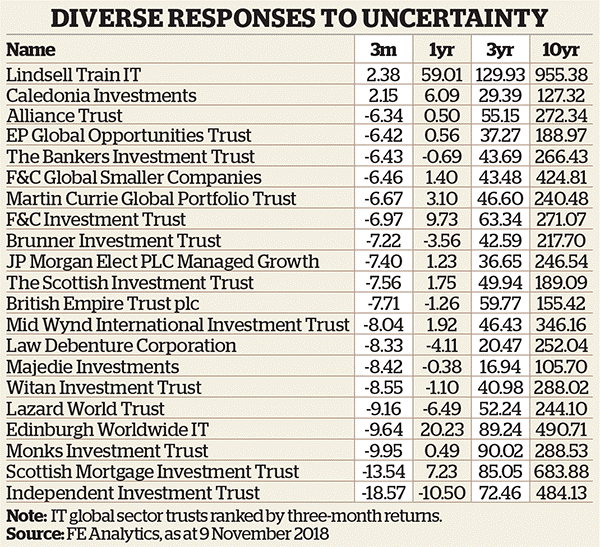These are the global trusts that offer defensive diversification
19th December 2018 10:19
by Fiona Hamilton from interactive investor
There are useful ways to counter persistently volatile and unpredictable financial markets. Fiona Hamilton explains the beauty of trusts in the global sector.

With so many political and economic worries confronting world stockmarkets, and rising interest rates threatening bonds as well as equities, it is hard to know where to turn.
UK quoted companies look cheap compared with their overseas counterparts, but Brexit uncertainty is now compounded by the potential threat of a Corbyn-led government. Despite recent setbacks, some believe the US bull market has further to run. Others have turned cautious, including Garrett Fish, who manages the £1 billion JPMorgan American Trust and has cut its gearing to nil.
JAM's chairman, Kevin Carter, explains:
"While the company will remain fully invested in US equities, reflecting long-term confidence in the investment opportunities offered by the world's largest equity market, the manager's quantitative tools and qualitative views on valuation measures and broader economic indicators all point to a medium-term view in which expected returns may be muted."
Defensive measures
Investors may be tempted to take as much as possible off the stockmarket table at this precarious time. However, holding sterling cash will not look clever if the pound lurches downwards.
One option is to shelter some funds in one of the ultra-defensive trusts in the flexible investment sector, such as Personal Assets Trust or Capital Gearing. Both prioritise capital preservation, are committed to zero discount policies, and have spent years preparing for a major bear market. They have therefore kept a lot of their assets in short-duration top-quality bonds, which can be turned into cash for bargain-hunting when markets look sufficiently beaten up.
On the other hand, those with long-term investment horizons may reflect that, despite dramatic setbacks over the decades, equities have always reverted to an upward trajectory and that market timing is notoriously difficult. Getting out near the top is hard, but getting back in again near the bottom can be even harder, as those who missed out on the sharp recoveries in early 1976 and spring 2009 discovered to their cost.
On this basis, it could make sense to consider the global equity trusts, as they have the flexibility to adjust their exposure to different countries and sectors as circumstances change. By and large, they are entrusted to senior and highly experienced managers, and some (notably Bankers, Monks, Scottish Investment Trust and Scottish Mortgage Trust) have very competitive costs.
The seven trusts in the global equity income sector all offer yields of over 3% paid quarterly, which should comfort those who need some income from their investments. However, quite a few of the global generalists have also increased their dividends every year for decades, and would hate to spoil that record.
Of the global generalists, only Mid Wynd International and Martin Currie Global Portfolio are overtly committed to keeping their share price very close to NAV come wind or weather, but F&C Investment Trust, Monks, Scottish Mortgage and Witan have all shown that they are prepared to make active use of buybacks and new issuance to keep their discounts tight in most market conditions.
Even these trusts could see their discounts widen out for a while if markets plummet, adding to the grief for those who need to sell. However, they should be to the fore in bringing them back under control once the situation settles.

Past performance is not a guide to future performance
Diversification
Some global trusts have much more diversified portfolios than others. This can work two ways, in that it reduces their vulnerability to individual company shocks, but also reduces their ability to benefit from their manager's highest-conviction ideas – which can be a key contributor to outperforming their benchmark.
F&C Investment Trust is one of the most diversified global trusts, with holdings in over 500 companies across 35 countries. This reflects its top-down approach, with manager Paul Niven responsible for allocating two thirds of the portfolio to regional specialists, each of whom assembles their own portfolio. About a fifth of the assets are entrusted to a mix of global strategies, and the balance to private equity. Niven did well to slash FRCL's UK weighting soon after taking over, and hedges the trust's US bets by splitting its substantial exposure between a value- and a growth-oriented manager. Gearing is currently a bit above average for the sector at 7%.
FRCL targets long-term growth of both capital and income, and has raised its dividend in each of the last 47 years. Its NAV returns fell pretty much in line with the FTSE All World index in the year to March 2009, and staged a similarly strong recovery to the index over the next nine and a half years. As one of the oldest and largest trusts, it looks well-placed to survive future setbacks in reasonable shape.
Alex Crooke, who manages Bankers Investment Trust, similarly delegates regional portfolios to specialist managers, so as to spread the investment risk across a portfolio that is widely diversified by geography, sector and company. At the end of September the trust had nearly 200 holdings and minimal gearing.
Its twin objectives are capital growth in excess of the FTSE World index and dividend growth in excess of UK retail price index inflation. It has done well with the latter, having raised its total dividend in each of the last 51 years, and by an average 6.9% a year over the last five.
Disappointingly, it has been less successful in growth terms relative to the FTSE World index over the last five years. This could be partly due to its 24% UK weighting, and also to the manager’s value-oriented approach, which has served the trust well over the long term but has been out of fashion in recent years.
Witan (WTAN) and the Alliance Trust both split their portfolios among a number of third-party managers and therefore have well-diversified portfolios of around 600 and 181 holdings respectively.
Alliance Trust is more concentrated as it has only eight external managers, seven of whom are restricted to their 20 highest-conviction stocks. This means each one's performance could be volatile, but their combined performance should be much less so, as their contrasting styles should shine at different times. Witan is better established, and its asset allocation is more actively managed, but over 40% is entrusted to three global managers. Its recent NAV returns have lagged FRCL's.
Concentrated portfolio
Most other global trusts have abandoned the traditional top-down allocation to different regions, and concentrated their portfolios down to less than 90 of their management team's best ideas. The massive Scottish Mortgage epitomises this approach, with its top 30 holdings accounting for 80% of assets, and 15% in 37 pretty illiquid unlisted companies. Chinese and North American listed companies together account for around 70% of SMT's portfolio, and technology, consumer services and healthcare for about 80%.
The manager's ultra-high conviction approach has produced stunning 10-year returns, but shareholders need to share his 10-year investment horizon as it can result in volatile short-term returns, as demonstrated recently.
Mid Wynd International has performed well since Artemis took charge in 2014. Its three managers target a globally diversified portfolio, with 55 to 79 holdings spread across eight to 10 different themes. They seek to buy at reasonable valuations – whereas SMT is prepared to pay massive multiples for companies it expects to grow exceptionally fast – and favour companies that they expect to continue to grow their cash flows in most conditions.
The team recently increased exposure to their 'high quality' theme, which they expect to "give a good balance against the more growth-oriented parts of the portfolio" in more turbulent markets.
Those who think value will reassert its long-term superiority could be drawn to EP Global Opportunities, or the Scottish Investment Trust, which have concentrated their portfolios down to 38 and 54 holdings respectively while maintaining a wide geographic spread. Both steered clear of soaring technology stocks, and both are cautiously positioned, with SCIN having no gearing into equities and EPG 6% liquid.
Those who still like growth, but want it to come from a variety of sources, could consider SMT's stablemate Monks. Its three managers, led by Charles Plowden, draw on the best ideas of Baillie Gifford's entire team to build a portfolio that deliberately includes exposure to all main regions and a variety of sectors, as well as a variety of different growth categories that are expected to show at their best in different scenarios.
The three managers have different investment styles, but must all agree to every purchase, and holdings are generally capped at 4%. Monks has done well since its current team took charge in March 2016, and should be much less volatile than SMT; however, both could flag if a value-oriented approach returns to favour. In addition, Monks has a negligible yield.
Investors need to think hard about which of these trusts will provide them with the best core holding or holdings over the next few years, and then stick to their choice. This is because moving around always pushes up costs, and in volatile markets it is all too easy to get whiplashed (ie move from one trust to another just as the former’s fortunes are about to improve and the latter is about to lose ground).
Full performance can be found on the company or index summary page on the interactive investor website. Simply click on the company's or index name highlighted in the article.
This article was originally published in our sister magazine Money Observer, which ceased publication in August 2020.
These articles are provided for information purposes only. Occasionally, an opinion about whether to buy or sell a specific investment may be provided by third parties. The content is not intended to be a personal recommendation to buy or sell any financial instrument or product, or to adopt any investment strategy as it is not provided based on an assessment of your investing knowledge and experience, your financial situation or your investment objectives. The value of your investments, and the income derived from them, may go down as well as up. You may not get back all the money that you invest. The investments referred to in this article may not be suitable for all investors, and if in doubt, an investor should seek advice from a qualified investment adviser.
Full performance can be found on the company or index summary page on the interactive investor website. Simply click on the company's or index name highlighted in the article.
These articles are provided for information purposes only. Occasionally, an opinion about whether to buy or sell a specific investment may be provided by third parties. The content is not intended to be a personal recommendation to buy or sell any financial instrument or product, or to adopt any investment strategy as it is not provided based on an assessment of your investing knowledge and experience, your financial situation or your investment objectives. The value of your investments, and the income derived from them, may go down as well as up. You may not get back all the money that you invest. The investments referred to in this article may not be suitable for all investors, and if in doubt, an investor should seek advice from a qualified investment adviser.
Full performance can be found on the company or index summary page on the interactive investor website. Simply click on the company's or index name highlighted in the article.